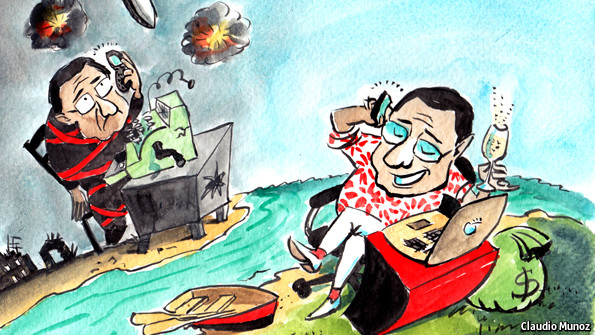During the year 1970, Cheikha Jamale Sejaan el Khazen, widow of Cheikh Farid Son of Nayef Son of Salibi from the house of Cheikh Abou Kansso Fayyad el Khazen from Ghosta, and her daughter Cheikha Marie-Therese el Khazen, mother of MP Cheikh Farid Elias el Khazen, founded a church to honor Saint Rita in […]
Beirut, Lebanon (CNN) — Mohammad Chaar wasn’t looking to become a martyr — or a victim. Late last month, the 16-year-old student was just hanging out with his friends in downtown Beirut, out of school and having fun. They all took a selfie to mark the moment, and never expected that moment would become […]
A “suspicious” man arrested by the Internal Security Forces on Wednesday in the Beirut southern suburb of Haret Hreik has turned out to be a renowned Lebanese rapper. “He raised suspicions due to his beard and was taken for interrogation while his car was inspected and it did not contain any explosives,” al-Jadeed […]
GlobalData, a London-based consultancy company, said Tuesday that international oil firms were still keen to bid for Lebanon’s offshore gas exploration despite the delays in an expected auction and political instability. “Lebanon’s first offshore bidding round has generated significant interest from oil firms, and while ongoing political instability has led to its third […]
A suicide bombing rocked on Tuesday Beirut’s southern suburbs for the second time this month, leaving at least four people dead, the state-run National News Agency reported. Red Cross Operations Director George Kettaneh told local TV stations that at least two people died in the blast that hit the Haret Hreik district. But NNA said four […]
economist.org edition – Print edition

ON A recent flight from Beirut to Addis Ababa, Lebanese businessmen were swapping stories. “Business is excellent in Angola,” declared one. “I hear it’s good in Ghana?” inquired another. Flights out of Lebanon buzz with optimism. For Lebanese businessfolk, the juiciest opportunities are abroad.
More people of Lebanese origin live outside Lebanon than in it (perhaps 15m-20m, compared with 4.3m). Many have done well. Carlos Slim, a Lebanese-Mexican telecoms tycoon, is the richest man in the world. Carlos Ghosn, a French-Lebanese-Brazilian, is the boss of both Renault (a French carmaker) and Nissan (a Japanese one). Nick Hayek, a Swiss-Lebanese, runs Swatch, the biggest maker of Swiss watches.
Lebanese people have long had wanderlust. Ancient Phoenician merchants roamed the Mediterranean, setting up cities such as Carthage and Cadiz. In the past century and a half, waves of Lebanese have left for the Americas and west Africa. Lebanon’s long civil war prompted many more to pack. Some 7m Lebanese and their descendants now live in Brazil, 3m in the United States and at least 250,000 in west Africa. They do everything from running restaurants to dealing in diamonds. By and large, they find business easier elsewhere than back in their fragile motherland.
Fadi Nahas, for example, has lived in Turkey since the late 1980s, when Lebanon’s war was still smouldering. He runs 15 companies that store and transport fruit and other perishables. Like many Lebanese, he is multilingual, speaking Arabic, Turkish, English, Italian, Spanish and French. “We’re like the Swiss with the number of languages we speak,” says Mr Nahas. “But tell me the last time they had to deal with a bomb or a power cut?”
BEIRUT: Garbage piled up on the streets of the capital and other parts of the country over the weekend, with waste collectors still unable to address the problem due to an ongoing sit-in by activists at the landfill serving Beirut and Mount Lebanon. Places such as Hamra and Hay al-Sellom were among the […]
As the trial of suspects in the assassination of Rafiq Hariri begins, I confess to having mixed feelings about the process that led us to this stage. Despite the optimism in March 14, the trial comes across as one that makes the best of a process that should have gone differently. Supporters of […]



